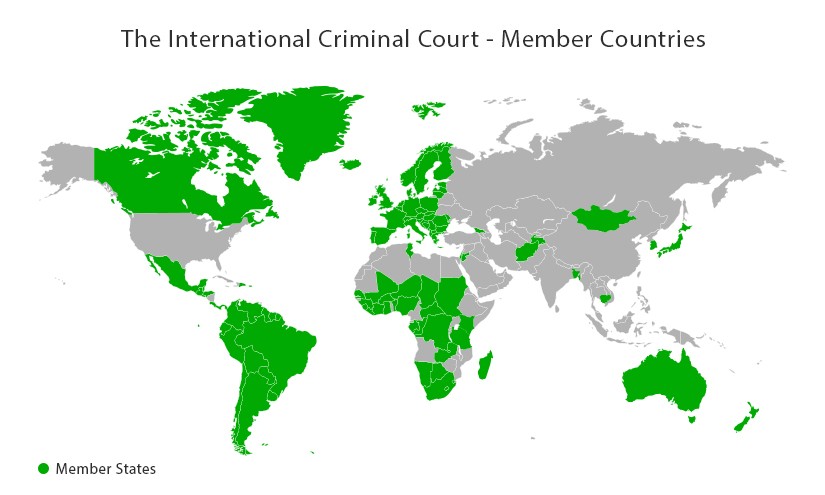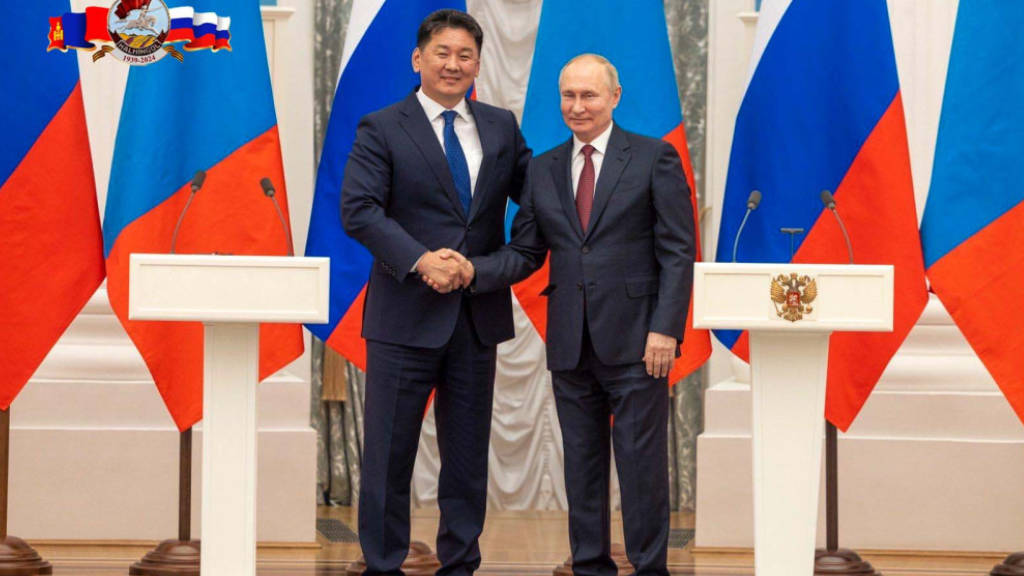
Mongolia has ignored the arrest warrant issued by the ill-named “International Criminal Court” (ICC), a legal institution based in the Hague. The ICC had issued a warrant for the arrest and detention of the Russian President, Vladimir Putin, on charges of war crimes committed in Ukraine. Western media has made much of Mongolia’s non-complicity during Putin’s visit to the country, however the reality of the ICC’s failure to instigate an arrest lie far beyond Mongolia’s reticence to execute a warrant against the leader of a benefactor state, which is how this episode is being played out in Western media.
In fact, the ICC has over-stated and overplayed its capabilities for some time. Although in essence, a good idea – the ability for an international court to have jurisdiction over all countries in cases involving ‘crimes against humanity’, the ICC’s agenda was compromised in this regard as long ago as 2001. This was when then-President George W. Bush signed into US law the “American Service Members Protection Act” which prevented any US personnel from being tried in any other courts worldwide, regardless of the crimes they had committed. The United States also failed to ratify the ICC commitment, despite earlier assurances that it would participate in the ICC remit.
The United States position
In addition to non-US participation, and despite it occasionally making political statements applauding ICC actions (as President Biden did when it issued a warrant for Putin’s arrest), the United States has also been actively hostile to the ICC.
Incredibly, Washington issued sanctions against ICC officials, their employees and family members, including lead prosecutor Fatou Bensouda, when the ICC decided to investigate allegations of war crimes against US soldiers in Afghanistan. The case was subsequently dropped, although the sanctions on the individuals concerned remain.
An non-international, “International Criminal Court”
The United States is not the only country, despite the ICC’s grandiose title, to refrain from, or terminate membership. Russia also decided not to ratify its recognition of the ICC following the US lead, while neither China, India, or Israel, along with numerous other countries have also abstained. Most of these have rejected the ICC’s jurisdiction because of the actions of the United States in failing to recognise the ICC itself. That was perceived as placing US nationals above the laws as pertained to every other world citizen and has been largely deemed unacceptable.

Allegations of Colonialism
The ICC has also faced allegations of promoting colonial-era racism and favouritism among African States, several of whom has resigned their membership or refused to ratify the agreement. These include Burundi, Gambia, Kenya, Namibia, and South Africa, while the African Union has also threatened to withdraw. Statements have been made that “African countries have rejected the double standard that the ICC is applying in dispensing international justice. We note the non-prosecution of war crimes committed in Iraq by American troops while attempts are made to single out other nationals of African descent.”
The Mongolia Situation
Mongolia is a member of the ICC and is bound by its treaty to arrest anyone accused of crimes by the court and under an arrest warrant, as is the case with the Russian President. However, Russia does not recognise the ICC’s jurisdiction, meaning that Mongolia has instead deferred the ICC jurisdiction to that of the Russian courts and legal system, as Putin is a Russian national. As there are no warrants for Putin’s arrest issued in Russia, the Mongolian perspective has legally been that Russian laws are the overriding factor when it comes to Russian nationals.
On top of this are four other considerations:
- Lack of Precedent
There has been no other precedent for any other sitting President or Head of State to have a warrant issued for their arrest. Yet the ICC went ahead and issued such a warrant. This is generally perceived as being in breach of ‘diplomatic immunity’ and an unspoken agreement not to target sitting National Leaders while they are in office. In taking this stance – which it knew would be unlikely to be actioned – the ICC has in fact, while attempting to demonise the Russian President, introduced in addition a very public acknowledgement that it actually has no enforcement procedures in place and very little (and now even more diminished) ability to dispense justice. - Legality and Confidentiality
What hasn’t been mentioned in Western media are the ICC’s own protocols in requesting a member state to execute an arrest warrant. In fact, these are very strict and highly confidential. The contents of any ICC warrant must remain confidential (meaning any reporting about it is purely subjective) and must send official requests to the government concerned both in terms of the background to any case, as well as any arresting procedures to be carried out, maintaining this same confidentiality. This means that it is impossible to know whether the ICC actually sent any official request to Mongolia. Assumptions are speculative.
This means that it cannot be determined whether Mongolia is ‘actually’ and ‘legally’ obliged to carry out the arrest according to the ICC warrant and the Statute. On the other hand, while the Statute addresses provisions for support from State Parties to the ICC regarding arrest and similar matters, it should also be highlighted that the Statute does not make reference to cases where less powerful countries might need support from the ICC or other bodies. It does however acknowledge that “many other international law principles” must also be considered when discussing an arrest. In short, membership of the ICC does not automatically equate to immediate arrest warrant compliance. - National Security
Mongolia is partially dependent upon Russian trade, both with it, and via transit routes through to Russia’s largest client, China. Any damage caused to the Mongolian relationship with Russia could significantly damage Mongolia’s national security. When it comes to protecting the well-being of Mongolian citizens, against upholding an arrest warrant issued by a European-based court, Ulaan Baatar has opted to protect the interests of its own nationals. - Ukraine Is Not Mongolia’s Conflict
With the ICC warrant issued against Putin for alleged war crimes in Ukraine, and somewhat absurdly “the abduction of Ukrainian children” Mongolia has effectively indicated that the debate between President Putin and the ICC over culpability is not its concern, and that it does not wish to become involved, despite pressure to do so. As a democratically elected government, the ICC – and other interested parties – should respect that position, even should they disagree.
The West’s Response
Kiev has now accused the Mongolian government of being implicit in war crimes in Ukraine as a result of their decision not to arrest Putin, a statement unlikely to sit well in Ulaan Baatar right now, as the country holds memorial services relating to the defeat of the invading Japanese army – who inflicted significant atrocities in Mongolia in 1939.
In trade terms, in 2023, Ukraine exported US$23.5 million worth of goods to Mongolia, while Mongolia reciprocated with exports worth just US$42,000. None of Ukraine’s exports to Mongolia are essential, and all are easily replaceable should Ulaan Baatar take exception to Kiev’s remarks.
The EU’s response thus far has been rather more measured, stating it is ‘regrettable’ – however some minor sanctions against Mongolia cannot be ruled out given Brussels aggressive attitude to what it now views as ‘errant’ or ‘incorrect’ decisions made by other governments. Mongolia’s politicians’ meanwhile, as fiercely patriotic and defensive of their own democracy as they are, would well regard that as interference in their own sovereign affairs. In December, they are due to sign a Free Trade Agreement with the Eurasian Economic Union – which includes Russia.
Summary
The West will undoubtedly spin this situation as an attempt by Putin to undermine the ICC, whereas in actual fact it has been operating on a divided and somewhat biased assumption that some citizens can be more guilty than others for the past 23 years. For that, the historic responsibility for the non-performance of the ICC must rest largely with the United States, but also with the Hague and the ICC themselves for issuing arrest warrants for what are political statements as opposed to creating any real actionable justice. The ICC has diminished itself, and been dealt what could be a mortal blow by a small, democratic nation who has decided that its ultimate responsibility lies with its own electorate and not that defined by politicians based in Europe, the United States, or Ukraine.
Further Reading
Russia-Mongolia-China Economic Corridor To Be Developed

 Русский
Русский













